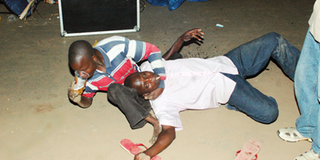Prime
Alcoholism is on the increase in Uganda and needs to be curbed

What you need to know:
Bosco Mugisha (not real names), is 24 years old. The first of four children, he was raised in a Christian home that regularly went to Church and ensured he had the best education they could afford. For his O level, he joined Ntare School, where he encountered a different life altogether.
There are growing concerns among health workers over Ugandans’ drinking patterns. Surveys have shown an alarming rate of alcohol consumption across the country, writes Egan Tabaro.
“I had never lived on my own before and this school had so much freedom and this was the time I was discovering myself,” he says. In his S.2, he joined the school’s Scripture Union, where he prayed and studied the Bible as he often did at home.
Soon, he made new friends and together, they would sneak out of school, mostly to watch a movie and eat roast pork in Mbarara Town and have a drink in the name of “experimenting”. By S.4, he had begun to drink regularly as he had both the company and money for it. For his A’levels, he joined Greenhill Academy, an elite day school in Kampala. His drinking continued and he often sneaked alcohol in sachets into school but still managed to perform well enough in class to escape notice from his teachers and parents.
In his S.6 vacation, Bosco broke up with his girlfriend. He was devastated and it was then that he says he lost control over his drinking. He was drinking daily and quite heavily and one time drank himself into a coma before he was admitted to a hospital. “But I still didn’t realiseI was a rehab case,” Mugisha says, adding that he was in denial. What followed then was a two-month dry spell (in which he didn’t take alcohol) but this didn’t last. when he joined university, the drinking started all over again.
For him, university life was one long party - more drinking, more girls, and more beers. He often got into bar brawls and was twice locked up by police for violent behaviour. He suffered blackouts from binge drinking and even stole from family, friends and his girlfriends to finance his habit. His drinking changed his personality and an otherwise amiable fellow soon became rude, arrogant and distant. “Alcohol dehumanised me completely,” he says. Soon, he was unable to sit tests and exams at university and his parents often took him in and out of rehab. He dropped out of university. He had hit rock bottom. Now, as he nurses an injury sustained from a drunken fall, he has been sober for four months and is now born again. “The compassion of people around me, my involvement with Victory Rehabilitation Centre, Salongo Kanda Road, Bweyogerere Kampala and my faith in Christ have helped me remain sober,” he says.
The facts and statistics
Alcoholism is a chronic disease marked by a craving for alcohol; people who suffer from it, known as alcoholics, can’t control their drinking even when it becomes the underlying cause of serious harm including medical disorders, marital difficulties, job loss or car accidents. People tend to equate any kind of excessive drinking to alcoholism but doctors and scientists prefer to use the term alcohol dependence instead of alcoholism to designate less severe disorders resulting from immoderate drinking.
The World Health Organisation (WHO) estimates that 140 million people (approximately two per cent) suffer from alcohol related disorders. A WHO Global Status report on alcohol estimates that Ugandans consume an average 19.4 litres of alcohol per capita annually. A Ministry of Health baseline survey of 14 districts found the mean prevalence of alcohol abuse to be 17.4 per cent while surveys from hospital admissions found that up to 20 per cent of the cases are alcohol related.
According to psychiatrist Dr David Basangwa of Butabika Hospital, the average first age of drinking in Uganda is 10 to12 years and that 60 per cent of those who seek treatment at Butabika’s Alcohol and Drug Unit are aged 13 to 21. Research has shown that people who drink before the age of 15 are more likely to become alcohol dependent than those who delay their first drink to 21 years.
There are an estimated 26 registered breweries licensed to operate in Uganda although most of the alcohol consumed is produced informally in homes or from unregistered small scale distillers and brewers, making it difficult for authorities to regulate alcohol production, sale and consumption in the country.
Scientists have not identified a typical alcoholic personality, and they can’t predict with certainty which drinkers will progress to alcoholism. Statistics show that alcoholism affects a broad cross-section of society around the world, from labourers, homemakers, successful business executives and academics to church members of all denominations. Scientists cannot point out any single cause of alcoholism but research suggests that genetic, psychological and social factors influence its development.
Studies show that alcoholism runs in families - alcoholics are six times more likely than non-alcoholics to have blood relatives who are alcohol dependent. Research conducted in twins showed that patterns of alcoholism differed among identical twins who share identical genes and fraternal twins, who are genetically different. If one twin becomes alcohol-dependent, an identical twin is more likely to develop alcohol dependence than a fraternal one.
Environmental factors that may affect the development of the disease include personal behavioural skills, peer influences early in life, parental behaviour, societal and cultural attitudes toward alcohol use and availability of alcohol beverages. It is argued that once a person has established a drinking pattern, environmental factors combined with physical changes induced by heavy drinking may reinforce the continued use of alcohol.




